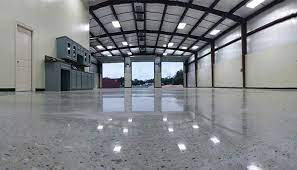Epoxy Garage Floor Basics
Epoxy coatings are used for a variety of things: boats, floors, and anything else that needs a strong, waterproof coating. If you are considering using an epoxy based paint for your garage or warehouse floor, you probably want a little background information on epoxy based products, including: their makeup, what they can and can't do, useful life, and other helpful tidbits. This information should be helpful for a couple of reasons, the most important being if you are going to spend money to upgrade the surface of your building, you want to make sure you are purchasing the right product at the right price.
To begin, epoxy coatings of all types share several characteristics: (1) they have outstanding chemical resistance; (2) they are extremely durable; (3) they have a low metallic epoxy flooring modesto porosity (things do not easily get seep into the coating - think oil stain on concrete); and (4) they have a strong bond strength. These qualities make epoxy floor products a great tool to improve both the look and functionality of your garage floor. And although other products are out there that may be better, nothing is currently available that is easy to get and relatively inexpensive.
The magic of epoxy floor paint happens because of a simple chemical reaction. There are two parts to epoxy: a base and a curing agent. When these two components are mixed in a certain ratio, a chemical reaction occurs, causing heat, which causes the mixture to harden into an inert, "plastic." The reaction takes less than 24 hours, making it extremely convenient for many different uses.
It's not all sun and roses for epoxy floor products, however. Epoxies will yellow and chalk over time, particularly if exposed to lengthy periods of direct sunlight (the UV rays break down the chemical bond, causing yellowing and diminishing the epoxies durable qualities). To combat this, there are UV protectant clear coats that can be applied to the final floor product. Although this does tend to increase the cost of the floor, it can have a profound effect on the life, and look, of your new epoxy garage floor.
Working with epoxy products also takes a little skill. Because it is a chemical compound, it does have a specific shelf life, or time when it can be used. This shelf life can be anywhere from minutes to hours, depending on the mixture and how it is handled. As was mentioned earlier, heat is a result of the chemical reaction, so as the mixture nears the end of its usefulness (before it sets) it will become very hot. Additionally, epoxy garage floor paint can only be used in temperatures above 50 degrees. Below that, the epoxy becomes too thick and takes too long to cure.
And finally, if it didn't make much sense before, it probably will now: these products are best applied using a professional experienced in working with epoxy garage floor paint. There are many things that can go wrong when applying this product, the cost of epoxy products is not cheap, and there are people out there that do this for a living. Make sure it's done right the first time and hire someone experienced. In the end it will save you both time and money.

.jpg)
.jpg)
Comments
Post a Comment